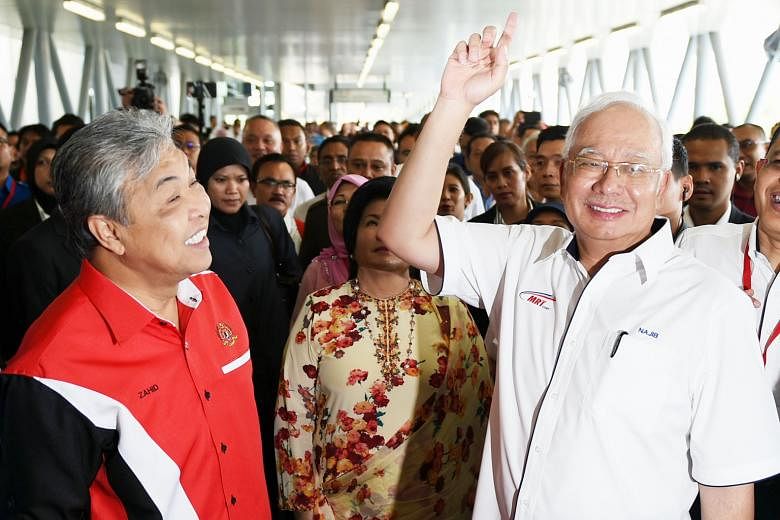KUALA LUMPUR • Judging by the frenetic pace of his political engagements in recent weeks, Malaysian Prime Minister Najib Razak appears firmly on election footing.
He has held closed-door retreats with warlords from his ruling United Malays National Organisation (Umno) party and met separately with top-level government officials, urging them to work the ground by speeding up the implementation of projects and dispensing financial handouts to the needy.
For crucial voting constituencies, such as the smallholders of state-owned plantation group Felda that represent a quarter of the 222 seats in Parliament, he has been more generous, dishing out giveaways amounting to RM1.6 billion (S$508 million) in the form of direct cash payments and debt relief.
There's more on the way.
Close associates of Datuk Seri Najib say that there will be big public-relations splashes in the weeks ahead with the launching of several key economic initiatives.
Among them is the Aug 9 kick-off of the RM55 billion East Coast Rail Link, the country's single largest infrastructure undertaking that will be built and financed by China.
The five-year mandate for the Umno-led Barisan Nasional (BN) coalition expires in mid-2018, but his key advisers are urging him to consider early polls to take advantage of Malaysia's relatively stable economic outlook and the uneasy state of affairs in the country's opposition alliance, according to close associates of Mr Najib.
Pushing the electoral face-off further down the road would give the opposition time to regroup under its new leader, former prime minister Mahathir Mohamad, who continues to command widespread respect among the politically dominant Malays that represent Umno's core voting constituency.
Gripes over the rising cost of living that ordinary Malaysians continuously lament over could also turn sentiment against the government, Mr Najib's associates argue.
Some time in late October or early November is where the current money is.
The strategy would be to shower windfalls on key voting constituencies, particularly semi-urban and rural constituencies that form the bulk of the parliamentary seats, before delivering a goodie-filled federal Budget Mr Najib will announce in the second half of October.
Whatever the timing, the coming general election is set to have huge implications for the country.
The Umno-led BN has been in power since independence in 1957, making it the longest-serving coalition government in the world.
But in the coming polls, the prospect of defeat for Mr Najib's ruling BN coalition is not being discounted, an outcome that would throw this South-east Asian nation of 32 million people into uncharted territory.
BN's showing in the last two elections has slipped from bad to near disaster.
In 2008, the coalition, under the leadership of former prime minister Abdullah Badawi, registered its worst ever electoral performance when it lost the customary two-thirds majority the BN long held in Parliament, and the state assemblies of Penang and Selangor - two of the country's most urban and economically developed states.

In 2013, BN's performance slipped further with the loss of the popular vote to the opposition and it only held on to power because of the country's gerrymandered constituencies.
Supporters of Mr Najib, who favour an early election, argue that conditions are not likely to get better and delaying the polls would risk the coming together of a rare combination of factors that could create a perfect storm against the Umno-led BN.
It is a valid fear when considering the factors behind the BN's drubbing in the last two elections.
In 2008, Tun Abdullah's administration not only faced a rejuvenated opposition led by former deputy prime minister Anwar Ibrahim, but it also had to contend with a very disgruntled and influential Tun Dr Mahathir, who in the run-up to that election openly accused his successor of being incompetent.
Support for the government from the Malay community suffered sharply then, an outcome that was caused by the so-called "Mahathir factor", which persuaded Malays to either vote against the BN or simply stay away from the ballot box.
In the 2013 general election, Dr Mahathir threw his support behind Mr Najib. Umno's showing improved slightly, but its non-Malay coalition partners suffered blistering defeats because urban voters abandoned the BN in droves, leading to the loss of the popular vote.
The anti-establishment sentiment among urban non-Malay voters has not shifted very much and the upcoming electoral contest will see a face-off like never before for the hearts and minds of the ethnic Malay community that determines the outcome of elections in Malaysia.
The Malay community is deeply divided, and pressures in dealing with sharp spikes in the cost of living and semi-urban and rural unemployment have triggered shifts in voters' sentiments about the government. For the moment, Umno still has the edge.
The move by Parti Islam SeMalaysia (PAS), the country's main Islamic party, to break away from the opposition alliance has raised the prospect of three-cornered electoral battles in the Malay heartland that would favour Umno.
But the opposition leadership is also aware that the coming polls present the best opportunity to defeat the BN and there are behind-the-scenes negotiations to form an electoral pact to minimise three-cornered fights, and ensure direct challenges between the opposition parties and the Umno-led BN.
Under such conditions, the Mahathir factor could prove crucial. Dr Mahathir remains popular with the rural Malays and his leadership of the opposition could prove crucial in tipping the balance in the opposition's favour among voters who have traditionally voted for the BN.
Malaysia is at a crossroads. Race relations have slumped and disagreements over religious issues are commonplace. The economy, too, is struggling to find new growth drivers, particularly with the prolonged bearishness in commodity prices.
There is no doubt project Malaysia needs a reboot.
The main issue in the coming elections will be whether the Umno-led BN can convince voters, particularly the country's Malays, that it is still the best candidate for the job.



